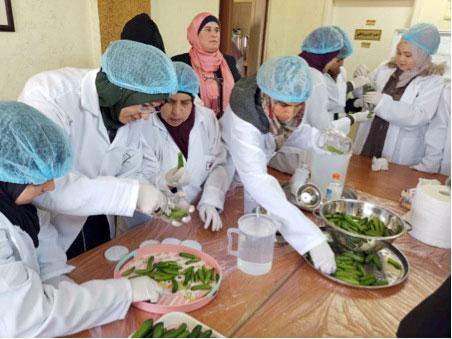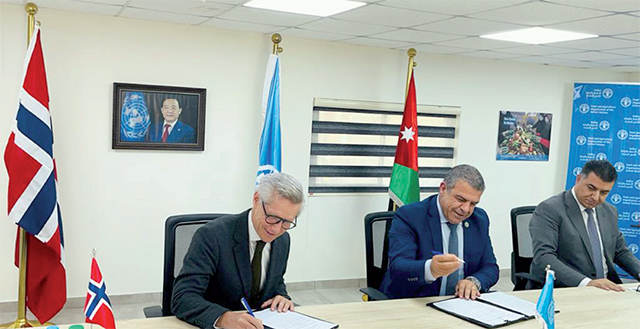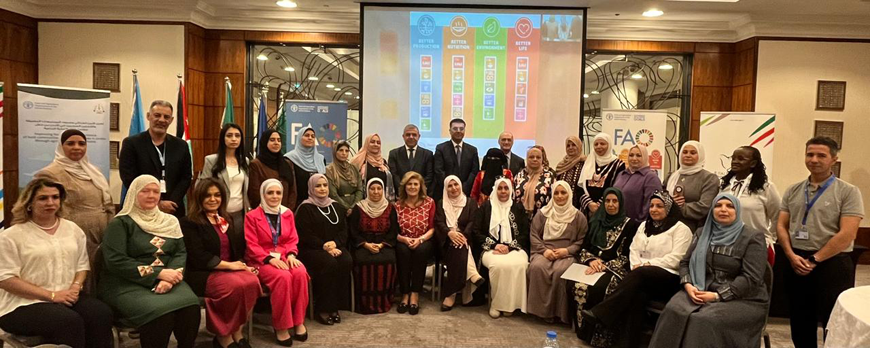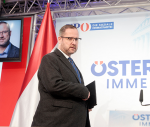You are here
Agriculture project to boost 500 vulnerable families’ livelihoods
By Saeb Rawashdeh - Jul 01,2018 - Last updated at Jul 01,2018
AMMAN — Investing in agriculture is always a long-term goal which pays off after decades of persistent, tenacious and meticulous planning. However, the focus of international organisations, donors and various stakeholders is too often on short-term projects in medical services and education, experts claimed.
On Sunday, the UN Food and Agriculture Organisation (FAO) signed two letters of agreement in its Amman headquarters: one with the National Agricultural Research Centre (NARC) and the second with the Nippon International Cooperation for Community Development (NICCOD) to implement the “Social Stability and Resilient Livelihoods for Syrian Refugees and Vulnerable Jordanian Farm Families from Hosting Communities” project.
The project, valued at $1 million, which were provided by the government of Japan, aims to boost agricultural livelihoods and resilience for 500 vulnerable families including 250 Syrian refugee families and 250 impoverished Jordanian households in Irbid, Mafraq and Zarka Governorates.
According to event organisers, around 3,000 people will benefit from this project, both directly and indirectly.
“The project aims to reinforce Jordanian social stability and local economies by restoring the livelihoods of Syrian refugees and their Jordanian host communities,” explained project manager Amjad Al Attar, noting that it will make a “significant” contribution to Jordan Resilience Plan for the Syria Crisis.
The plan, which is set in the 2017-2019 timeframe, aims to “address needs and vulnerabilities of Syrian refugees and Jordanian communities and institutions affected by the protracted Syria crisis”, especially by providing “enhancement of the food security situation while sustaining livelihoods”, according to Attar.
The two letters of agreement were signed by FAO representative in Jordan Nasredin HagElamin, Director General of NARC Nizar Haddad, and Yuiko Isoda on behalf of NICCOD, in the presence of deputy chief of mission Masahiro Tada, first secretary at the Japanese embassy Nana Watanabe and UN Resident and Humanitarian Coordinator Andres Pedersen.
“Our aims will be achieved through the establishment of home- and group-based, small-scale agri-food enterprises that will contribute in reducing food insecurity and under-nutrition, as well as increasing income generation at the household level and enhancing skills development and employment creation at the local level of rural and peri-urban communities hosting Syrian refugees,” Attar underlined, stressing that the project will use approaches with strong feedback mechanisms, which will take into consideration the current context so as to allow flexibility.
The project’s institutional set-up will also promote ownership of its interventions by Jordanian farmers and Syrian refugees, he emphasised.
“Strong capacity-building activities, based on needs analysis will enable the start-up and smooth implementation of project interventions,” Attar added.
Methodologies will ensure that activities are successfully implemented through FAO’s core areas of expertise in inclusive and efficient agri-food systems approaches, post-harvest management and small agri-business development, farmers’ business school methodology for participatory learning and conditional and restricted cash transfer/voucher systems, the project manager concluded.
Related Articles
AMMAN — The Food and Agriculture Organisation (FAO) and officials from the Japanese embassy in Amman recently attended a food processing exh
AMMAN — The Ambassador of Norway to Jordan, Espen Lindbæck, and the Food and Agriculture Organisation of the United Nations (FAO) Representa
AMMAN — The Food and Agriculture Organisation of the United Nations (FAO) in Jordan funded by the Italian Government through the Italian Age



















